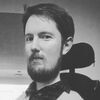
Miro Griffiths
- Course: MA Disability Studies
- Nationality: British, Slovene
What motivated you to apply to study your chosen course?
I became involved in disability rights at 14, becoming politically active and engaging with various traditional charities and user led organisations. I was aware of the social model of disability, the social construct of disability and how my identity was becoming increasingly politicised; I wanted to take my own personal experiences and frame it within the wider historical and social context of disablement. After finishing my undergraduate in psychology at University of Liverpool, I considered a Masters rooted within Disability Studies.
How would you describe your experience at the University?
The entire experience was thought-provoking, creative, entrenched in a variety of perspectives that encouraged discussions and aspired to be as inclusive as possible. The seminars, weekend study groups, informal chats with supervisors, online discussion groups with peers all facilitated a unique experience found within higher education. From the very start my involvement with the University was based on my human rights, recognising and addressing my access needs, understanding my background and what I wanted to achieve throughout my Masters and continuously prompting me to reflect on where I wanted to go.
I felt excited to attend classes and became committed to work on research topics that would bring about positive social change for marginalised groups. It was at the University of Leeds when I realised that, as a researcher, I needed to identify which side I am on and whether my current and future research is to support the oppressed or the oppressors. I thoroughly enjoyed the conversations about the purpose of research, the different methodologies that can critique and challenge inequality and, amongst other issues, the very purpose of education.
What did you think of your course?
The course was essential for my understanding of complex issues, debates and key historical events associated with disablement. In order to provide a convincing argument and articulate such matters to a diverse range of audiences, I utilised skills associated with research, exploring literature via libraries and online sources, and engaging with individuals from academia, civil society and state departments.
Higher education is an opportunity to critique and challenge the dominant political, economic and cultural discourse - so this provided me with time, resources and networks to reflect on my own position on a range of topics and develop the necessary skills to influence groups, research and report on particular subjects.
How would you describe the guidance you've received?
When I was working with lecturers, supervisors, prominent professors or support staff, my contributions were always welcomed and I was encouraged to recognise the significance of my ideas. Staff would always facilitate discussions, gently pushing me to reflect on the direction of my research and how it will support disabled people's emancipation. Although all staff were incredibly competent, knowledgeable and highly regarded in their fields, there was never any hint of arrogance, elitism or pomposity. My engagement with any staff member was built upon a foundation of respect, valued contributions and shared aspirations.
Since graduation, what have you been doing?
Since completing my Masters, I worked at a European human rights organisation with responsibility for liaising with the European Parliament on tackling social inequality, writing manifestoes and working with Member States to implement strategies and policies associated with improving disabled people's living conditions; I also continued my advisory work with UK government departments and civil society organisations. I was required to write reports, research extensively and facilitate people's understanding of specific issues.
My ability to carry out all these tasks, as well as others, was a result of my direct experience on the programme. Observing how the lecturers conveyed and facilitated knowledge, reacting to supervisors feedback in order to improve my work and having the space to explore issues that I am passionate about, all contributed towards my development.
Please tell us about your current role.
I returned to higher education in January 2015, to embark upon a PhD and teaching role at Liverpool John Moores University. My research is exploring young disabled people's views and experiences of the Disabled People's Movement. I also teach first and third year Sociology undergraduate students - I can empathise with their concerns, problems and queries, because I always remember the thoughts, confusion and ideas I had when I was in their position. My aspiration is to complete my PhD and then pursue a career in academia or politics.
What are your top tips in terms of careers for current students?
University should be a time to reflect on your own identity, ask questions regarding your aspirations and passions and spend those years deciding who you are and where you want to go. Always consider that the knowledge you are gaining, skills you are utilising and the opportunities that you access, are transferable and will be relevant at various stages of your life.
Our whole life is a learning curve but it requires quiet reflection. When I was completing my undergraduate and Masters degree programmes, I would always take one hour each week to sit alone, with the door closed, phone off and a laptop keyboard in front of me (because I cannot use paper and pens). This was the only time that I could find to think about the strategic, wider aspects of my work.
Frantically completing homework, manoeuvring between lectures, working outside of University to survive never allowed me to focus on the larger questions associated with my identity, research and the everyday politics of the world. This hour gave me time to consider the larger questions. Sometimes they were useful for having a break, sometimes they would inspire my research or provide me with new conversation starters with friends, family and my partner.
Throughout your whole life, continuously ask questions and recognise that it is perfectly acceptable to hesitate and research further before answering.

